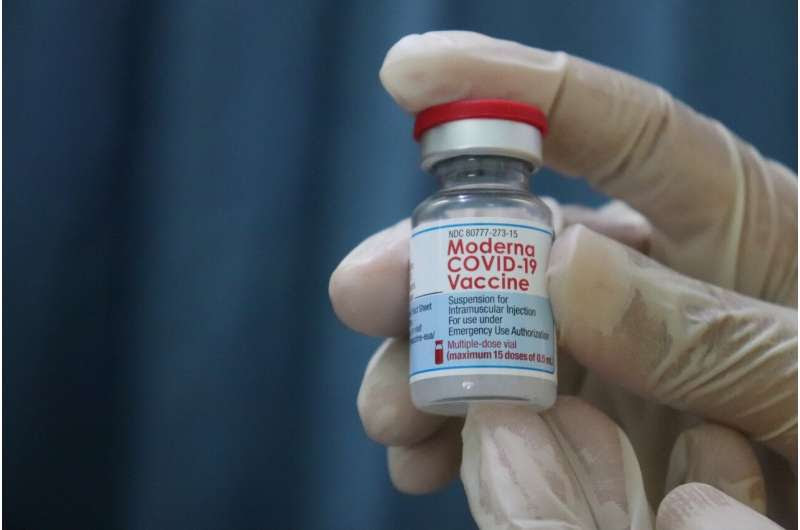by Sarah Avery, Duke University

Credit: Pixabay/CC0 Public Domain
A booster dose of Moderna’s COVID-19 vaccine showed signs of waning antibody levels against the omicron variant after six months, but the antibodies still remained effective against the variant in laboratory tests, according to a Jan. 26 study in the New England Journal of Medicine.
Assessing how well the Moderna mRNA COVID vaccine performed after a third dose, a team of researchers—including co-corresponding author David Montefiori, Ph.D., professor in Duke’s Department of Surgery and member of the Duke Human Vaccine Institute—found that omicron neutralization levels rose 20-fold within four weeks after the boost was administered, but fell 6.3-fold six months after.
While the antibody levels in study participants who received the boost continued to offer strong neutralizing activity, the levels of these antibodies declined faster for omicron than for the early SARS-CoV-2 virus that was circulating two years ago.
“The drop in antibodies for the booster is very similar to the drop in antibodies to the delta variant that was noted six months after the second dose of the vaccine,” Montefiori said, noting that the declining immunity to the delta variant prompted calls for a third dose, even before omicron became the dominant strain.
“This is not uncommon for mRNA vaccines or for vaccines in general,” Montefiori said. “Antibodies go down because the body figures it does not need to maintain them at that high level. It doesn’t mean there is no protection—there is immunologic memory.”
Montefiori said that once a person is infected or has received a vaccine, antibody-producing B-cells are activated, but go into a resting stage after the vaccine or virus is no longer present. If enough of these resting memory B-cells have been produced, they quickly reactivate when needed, making antibodies that can clear infections before the onset of severe illness.
Montefiori and colleagues studied serum samples from people who received one of two dosage levels of the currently approved Moderna mRNA vaccine, or of two variant forms of the vaccine in bivalent formulations (Wuhan-1 and Beta; Beta and Delta) that are under investigation.
The lower dose booster of the current Moderna vaccine authorized by the FDA increased antibodies to omicron 20-fold higher than peak omicron antibody levels post-dose two. The higher dosage of all three vaccines—the current vaccine and two investigational variant candidates—resulted in neutralizing levels about 2.5-fold greater than the lower dose of the current vaccine.
“The concern is that this virus might change enough that vaccines need to be modified,” Montefiori said, noting that Moderna is investigating a new vaccine formulation to specifically target omicron. However, that version was not among the vaccine candidates tested in the booster study.
“Our data show we are not there yet,” Montefiori said. “The vaccines are still working, and the boost is helping it to work better, even against omicron.”

Leave a Reply